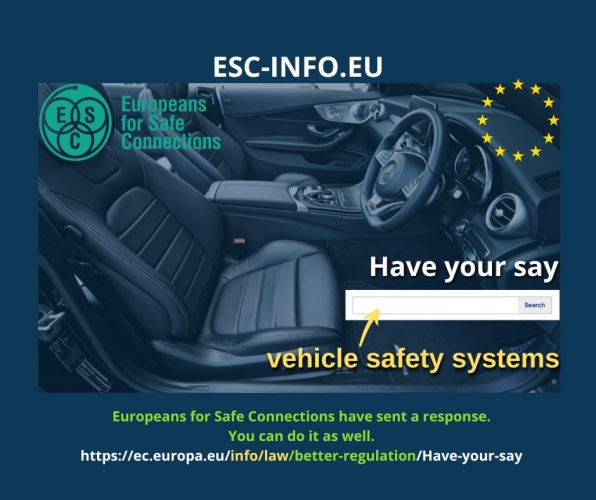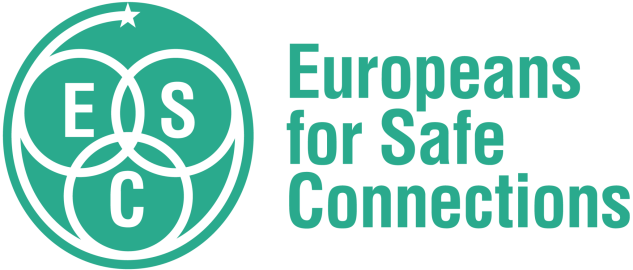
Have your say – vehicle safety systems
You can also get involved in forming EU laws. The European Commission offers a platform “Have your say” with the list of all new EU initiatives open for public consultation. You need to register to write your feedback: ec.europa.eu/info/law/better-regulation/have-your-say
Vehicle safety – type approval templates for vehicle safety systems
About this initiative: To help with the motor vehicle approval process, this initiative provides document templates that will help to ensure that EU vehicle approval legislation is implemented consistently across EU countries.
Feedback period: for stage 4 it is 15 February 2024 – 14 March 2024
Link: https://ec.europa.eu/info/law/better-regulation/have-your-say/initiatives/14106-Vehicle-safety-type-approval-templates-for-vehicle-safety-systems_en
Feedback from Europeans for Safe Connections
We, “Europeans for Safe Connections“, understand that this initiative provides document templates for the provision of information on the:
- intelligent speed assistance system
- driver drowsiness and attention warning system
- alcohol interlock installation facilitation
- event data recorder
- advanced driver distraction warning system.
The templates provided by this initiative are undoubtedly thorough, outlining detailed specifications for each vehicle safety system.
Our feedback is not technical but we express concerns about potential wireless connections inherent in the specified vehicle safety systems. Vehicle safety cannot be when it has impact on health. Inclusion of EHS people is required by UN Convention.
Our 2 main concerns are:
Number 1
The integration of intelligent systems raises apprehensions about increased exposure to radiofrequency radiation. According to ICEMAN project by DARPA, RF noise from on-board emissions may influence cognitive performance including task saturation, misprioritization, complacency and spatial disorientation.
The push to shift vehicles towards a higher level of automated control and tracking independent of the human subject is reaching a stage where the vehicle becomes a moving transmitter exposing its occupants and the surrounding environment to a wide spectrum of electromagnetic radiation moving in the radio, microwave and millimeter wave spectrum. Adding additional functionalities such as various mobile and wireless connectivities, active GPS, radars and other IoT telematics leads to an increase in cumulative RF EMF exposure.
Electromagnetic radiation emitted by wireless technologies poses an increased health risk. The threat increases when these technologies are used inside enclosed metal enclosures such as cars, buses and trains. However, cars equipped with advanced driver assistance systems (ADAS) with a range of sensors even in the millimetre wave spectrum expose pedestrians to radiation without their informed consent /knowledge and contribute to environmental pollution by electromagnetic pollutants. There are plans to use this millimetre spectrum also inside the cabins.
The public health authorities ( ANSES, The Health Counsil) reported a lack of studies on millimetre waves. But RF EMF has not yet undergone proper health or environmental assessment. People who do not want to use these technologies or do not want to be unnecessarily irradiated inside or near vehicles may suffer health damage. The creation of one-sided rules and the impossibility for the consumer to choose an alternative solution that does not have built-in wireless functionalities results in the suppression of the health rights of citizens and the discrimination against specific groups.
ESC warns that such systems, no matter how much intended for safety, can also risk making the driver more unconscious and irresponsible, because he/she is relying too much on “systems” for safety. We don’t think that putting the personal responsibility for safe driving of driver on technology is a proper step. A person suffering from wireless sickness may even faint or get heart problems.
It must therefore be the inherent option for drivers and passengers that new vehicles exist on the market that do not have these functionalities. Sometimes disabling the functionalities by software will not ensure zero exposure.
Automakers should provide clearly visible warning stickers on which the consumer will be warned regarding wireless radiation from ADAC, ISAS etc. The warning should also be included in the front of the manual, including a list of the radiation sources that the vehicles emit.
Number 2
Additionally, the inclusion of event data recorders prompts worries about extensive data collection practices, potentially compromising user privacy and raising questions about data security measures.
While prioritizing safety is paramount, we advocate for thorough assessment and transparent communication regarding the implications of wireless connectivity and data collection in vehicle safety systems.
PS: This feedback is in line with our previous feedback to eCall systems:
https://esc-info.eu/en/have-your-say-emergency-112-ecall-system/
and the feedback to Access to vehicle data
https://esc-info.eu/en/have-your-say-access-to-vehicle-data/
Best regards
Europeans for Safe Connections
This feedback was sent from a wired internet connection
– No use of harmful radiation
– Less electricity consumption
– Increased data security
Link to our feedback: https://ec.europa.eu/info/law/better-regulation/have-your-say/initiatives/14106-Vehicle-safety-type-approval-templates-for-vehicle-safety-systems/F3458684_en
Facebook post available for sharing: https://www.facebook.com/permalink.php?story_fbid=396952126405284&id=100082714988907



